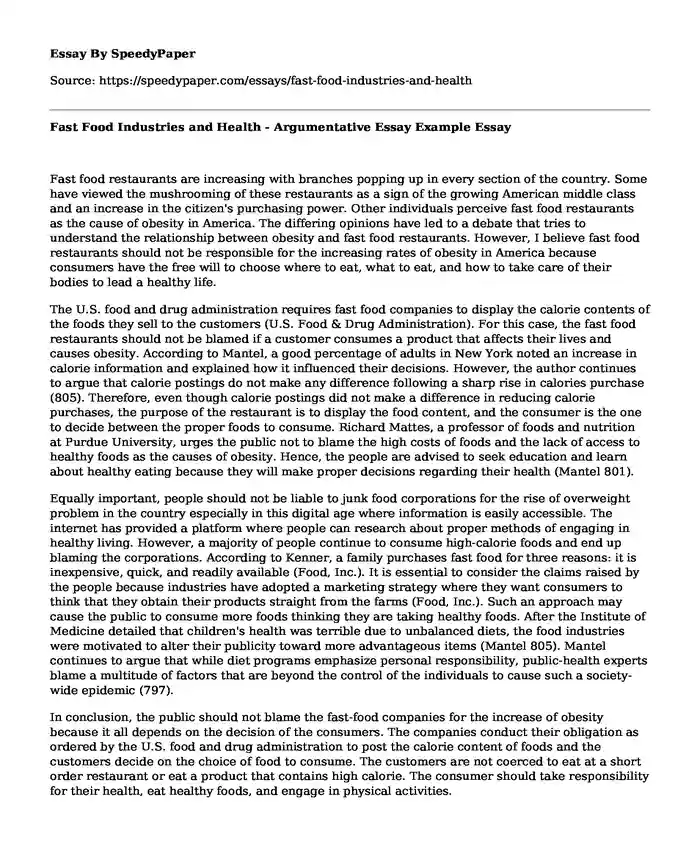
| Essay type: | Argumentative essays |
| Categories: | Diet Fast food |
| Pages: | 3 |
| Wordcount: | 675 words |
Fast food restaurants are increasing with branches popping up in every section of the country. Some have viewed the mushrooming of these restaurants as a sign of the growing American middle class and an increase in the citizen's purchasing power. Other individuals perceive fast food restaurants as the cause of obesity in America. The differing opinions have led to a debate that tries to understand the relationship between obesity and fast food restaurants. However, I believe fast food restaurants should not be responsible for the increasing rates of obesity in America because consumers have the free will to choose where to eat, what to eat, and how to take care of their bodies to lead a healthy life.
The U.S. food and drug administration requires fast food companies to display the calorie contents of the foods they sell to the customers (U.S. Food & Drug Administration). For this case, the fast food restaurants should not be blamed if a customer consumes a product that affects their lives and causes obesity. According to Mantel, a good percentage of adults in New York noted an increase in calorie information and explained how it influenced their decisions. However, the author continues to argue that calorie postings do not make any difference following a sharp rise in calories purchase (805). Therefore, even though calorie postings did not make a difference in reducing calorie purchases, the purpose of the restaurant is to display the food content, and the consumer is the one to decide between the proper foods to consume. Richard Mattes, a professor of foods and nutrition at Purdue University, urges the public not to blame the high costs of foods and the lack of access to healthy foods as the causes of obesity. Hence, the people are advised to seek education and learn about healthy eating because they will make proper decisions regarding their health (Mantel 801).
Equally important, people should not be liable to junk food corporations for the rise of overweight problem in the country especially in this digital age where information is easily accessible. The internet has provided a platform where people can research about proper methods of engaging in healthy living. However, a majority of people continue to consume high-calorie foods and end up blaming the corporations. According to Kenner, a family purchases fast food for three reasons: it is inexpensive, quick, and readily available (Food, Inc.). It is essential to consider the claims raised by the people because industries have adopted a marketing strategy where they want consumers to think that they obtain their products straight from the farms (Food, Inc.). Such an approach may cause the public to consume more foods thinking they are taking healthy foods. After the Institute of Medicine detailed that children's health was terrible due to unbalanced diets, the food industries were motivated to alter their publicity toward more advantageous items (Mantel 805). Mantel continues to argue that while diet programs emphasize personal responsibility, public-health experts blame a multitude of factors that are beyond the control of the individuals to cause such a society-wide epidemic (797).
In conclusion, the public should not blame the fast-food companies for the increase of obesity because it all depends on the decision of the consumers. The companies conduct their obligation as ordered by the U.S. food and drug administration to post the calorie content of foods and the customers decide on the choice of food to consume. The customers are not coerced to eat at a short order restaurant or eat a product that contains high calorie. The consumer should take responsibility for their health, eat healthy foods, and engage in physical activities.
Works Cited
"Calorie Labeling on Restaurant Menus and Vending Machines: What You Need To Know." USFood and Drug Administration Home Page, 2 Jan. 2018, www.fda.gov/Food/LabelingNutrition/ucm436722.htm
Food, Inc. - Interview with Director Robert Kenner. NOW on PBS, Public Broadcasting Service, 3 Mar. 2010, www.pbs.org/now/shows/523/index.html. Web 18 February 2018.
Mantel, Barbara. "Preventing Obesity." CQ Researcher, 1 Oct. 2010, pp. 797-820, library.cqpress.com/cqresearcher/cqresrre2010100100. Web 18 February 2018.
Cite this page
Fast Food Industries and Health - Argumentative Essay Example. (2022, Mar 22). Retrieved from https://speedypaper.com/essays/fast-food-industries-and-health
Request Removal
If you are the original author of this essay and no longer wish to have it published on the SpeedyPaper website, please click below to request its removal:
Popular categories




